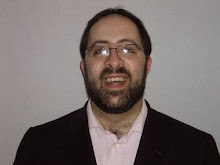This past Sunday was Downs Syndrome Awareness Day - 21st March. In my Synagogue I gave my sermon in Synagogue on the topic of Downs Syndrome, what it is and how it has touched my family. Here are some thoughts:
When my son Netanel had a brit mila, it was a difficult moment for us. We wished as is the traditional way, 'just as he entered the covenant, so should he enter into Torah, chuppa and good deeds'. Now there is no reason why my son should not be able to connect to the learning of Torah, and he is already doing many good deeds! But marrying, having children is different. Besides the complications involved in marriage, it is extremely rare that a child with Downs Syndrome will be fertile. And so when Netanel came in to our life, all the expectations of what a child would bring into our lives and achieved were sundered apart, and this was very hard to deal with.
What is Downs Syndrome? We do know that it exists in every cell of an individual's body if they have the Syndrome. Each of our cells has DNA, which can be viewed in 22 chromosomes and a 23rd gender chromosome. When conception occurs, the male and female contributions both contribute a chromosome so the resultant combination which is the early fetus carries 23 pairs of chromosomes. It is possible however that either the male or female sexual contribution can have an extra copy of a chromosome. If this copy is of the 21st chromosome, then the resultant child of this conception will have Trisomy 21 or Downs Syndrome. The former name is the medical name; the latter refers to John Langdon Down who first characterised and worked on the Syndrome in Teddington, South London.
Downs Syndrome brings with it a bunch of medical issues. 80% of those born with Downs Syndrome have hearing difficulties and due to the risk of regular ear infections, grommets operations are not advised. 40% of children are born with a heart defect. My son Netanel had a serious hole in his heart along with the existence of one, not two valves (mitral and tricsupid) inside the heart. He therefore underwent open heart surgery at 4 months old. This was traumatic for us, but in some ways it moved us on from thinking about his Downs Syndrome to thanking God that we had him at all. In fact once we took Netanel home from hospital it was like a new beginning - especially as he began waking up more at night!
What is common about Downs Syndrome between all who carry it, is that there will be a degree of learning and speech difficulty. This will vary greatly but it will always exist. Those with Downs Syndrome have a weaker short term verbal memory. This means they will be able to retain and process much smaller amounts than others their age. So if you ask a young child to bring you two items, they may well act on this. However a child with Downs Syndrome may only remember the first item. This is where Makaton sign has been very important. Derived from BSL it is a way of giving the child a visual support for all the main words to which they are exposed. There is a large Makaton vocabulary, and my wife and I have learned much of it over the last few years. We even have learned how to sign the 'Shema' and with Pesach coming up 'Ma Nishtana?'. Makaton has helped greatly our son connect with his environment, communicate with others and create the foundations for speech. He does say now many words and is putting them more often together.
What is important to recognise is that all those with Downs Syndrome are different. I have often heard people claiming that those with Downs Syndrome - 'are so loving', as if this would make us feel better. Well it simply is not the reality. They can have moods like others can. They can be depressed like others. In fact if those with Downs Syndrome develop enough cognitively to understand what they cannot achieve, that can be incredibly difficult for them.
On Shabbat, I read from a poem by Emily Perl Kingsley describing in a most brilliant way the feelings of having a child with Downs Syndrome. Here is a link to this poem:
www.our-kids.org/Archives/Holland.html
Above all we look at our son as a blessing. He teaches us so much about our responsibility to help those in need. The Torah teaches 'do not put a stumbling block before the blind'. When individuals find it difficult to achieve in society, out role is to help them along - not because we feel better, but because it is our duty to do so. He teaches us the importance of the will - that it can break through difficult situations and express itself in wondrous ways. My son will find it difficult to accomplish many things we all take for granted. But his will shines through, and we encourage it too.
Monday 22 March 2010
Subscribe to:
Posts (Atom)
